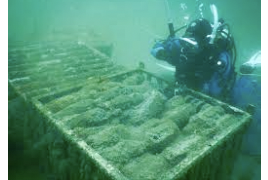Who knew that you needed top know this much !
On August 9, 2023, the Santa Barbara County District Attorney’s Office announced that, with the assistance of the City of Santa Barbara, California, and the California Bureau of Alcoholic Beverages Control, it had “disposed of approximately 2,000 bottles of wine and other alcohol . . . in connection with an illegal underwater wine aging and sales operation.” According to reports of this case, destroying the wine stemmed from a plea agreement entered into by three defendants who were caught placing wine crates one mile off the Santa Barbara coast. These actions were apparently done without receiving permits from the California Coastal Commission or the U.S. Army Corps of Engineers.
Because I had never heard of undersea wine-aging, I decided to dig a little more deeply into the legal elements involved in this matter.

Over the past several years, winemakers have been experimenting with new techniques in viniculture and viticulture. One method that has gained some traction outside the United States is aging wine in saltwater. Although I found no regulations specific to underwater wine-making from the European Union or Australia, news articles have mentioned that this process is increasingly popular in jurisdictions such as Croatia, Spain, Portugal, South Africa, and Argentina, among other nations.
In the United States, however, undersea wine-aging is prohibited. In 2015, the Alcohol and Tobacco Tax and Trade Bureau (TTB) issued an advisory “in response to recent interest in the aging of wine under ocean waters.” That notice provided:
TTB has consulted with the Food and Drug Administration (FDA) to determine whether wines aged under ocean waters would be considered adulterated under the Federal Food, Drug, and Cosmetic Act (FD&C Act), 21 U.S.C. § 301, et seq. It is TTB’s position that wines found to be adulterated under the FD&C Act are considered mislabeled within the meaning of the Federal Alcohol Administration Act (FAA Act), 27 U.S.C. § 201, et seq., which TTB enforces.
The FDA has advised us that aging wine in a way that bottle seals have contact with sea or ocean waters may render these wines adulterated under the FD&C Act in that they have been held under unsanitary conditions whereby they may have become contaminated with filth or may have been rendered injurious to health (21 U.S.C. § 342(a)(4)).
The TTB’s advisory goes on to list several potential risks related to undersea aging. It further notes that the laws prohibiting underwater wine-aging processes from occurring in the United States also prevent these wines from being imported by a “producer, importer or wholesaler, or other industry member subject to 27 U.S.C. § 205(e).”
It is possible, however, that a complete ban on these products may not be long-lived. Last year, the FDA issued a letter of no objection to a wine importer in Wisconsin, permitting the business to import wine bottles aged in the Adriatic Sea by a specific winery that had submitted a significant amount of evidence on product safety.
If you would like more information about wine and liquor laws in the United States, you may be interested in the following resources:
- Wine and Beer Law: Leading Lawyers on Navigating the Three-tier System and Other Regulations on Alcoholic Beverages
- Wine in America: Law and Policy
- Bourbon Justice: How Whiskey Law Shaped America
- The Field Guide to Drinking in America: A Traveler’s Handbook to State Liquor Laws
Subscribe to In Custodia Legis – it’s free! – to receive interesting posts drawn from the Law Library of Congress’s vast collections and our staff’s expertise in U.S., foreign, and international law.
Source
https://blogs.loc.gov/law/2023/09/federal-and-state-laws-on-underwater-wine-aging/?loclr=eaiclb




